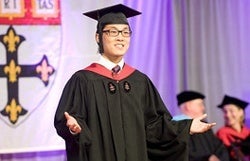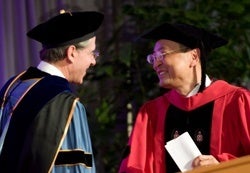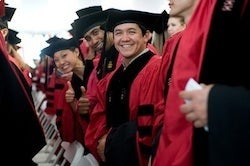May 25, 2012 — In his opening message at the 2012 Commencement Ceremony on May 24, Dean Julio Frenk spoke about the importance of “career plasticity.”
He quoted Sheryl Sandberg, the chief operating officer of Facebook, who said, “Fortune does favor the bold, and I promise that you will never know what you’re capable of unless you try.” Explaining why he chose to quote a business person instead of someone like Einstein, Pasteur, or even Plato, Frenk said that “tightly-defined career paths … are no longer the only routes to personal and professional achievement” for graduates of Harvard School of Public Health.
Frenk noted that the day’s commencement speaker, HSPH alumnus Gerald Chan, went on to a “bold, non-traditional career path” as an entrepreneur and innovator, but has continued to work on improving people’s health.
“No government—even that of the wealthiest nation—can afford to pay for all of the scientific research and public health programs that we require to keep people healthy,” Frenk said. “As a result, it is vital that we have people educated in science and public health who see opportunities where others see barriers—who are comfortable moving easily between the worlds of government, business, civil society, and academia, to improve people’s health.”
During the ceremony, held before an overflow crowd in a tent under warm, sunny skies in the Kresge courtyard, 515 degrees were awarded: 25 Doctors of Philosophy, one Doctor of Public Health, 53 Doctors of Science, 272 Masters of Public Health, 153 Masters of Science, and 11 Masters of Arts. At a festive reception the evening before Commencement, 14 students, seven faculty, and two staff members were selected for special recognition.
Students from 57 countries, 34 U.S. states, and the District of Columbia received degrees. Six out of every 10 members of the Class of 2012 were women.
A good pairing: science and the private sector
The Commencement Address was delivered by Chan, SM ’75, SD ’79, a founder of Morningside Group, which has provided support for companies and technologies that benefit the public’s health. Chan studied medical radiological physics and radiation biology while at HSPH. (Read more about Chan.)
Introducing Chan, Frenk said, “Gerald believes that the intersection of science and the private sector is a fertile territory for promoting the public good—and that working for private industry is not something to be feared or looked down upon.” He added that Chan’s career path has given him “first-hand experience of the slow, under-funded, and highly risky process of bringing promising research from academia to the marketplace. He has come to understand well the importance of pairing private capital with astute scientific acumen.”
‘Enrich your lives with ideas’
In his address, Chan spoke of three themes—“idea,” “public,” and “health.”
Chan said he sees “an impoverishment of ideas” in today’s society. “Politicians are known by their sound bites,” he said. “Messages with 140 characters or less encourage the communication of the trivial. Tweets are great for knowing where your friends are having dinner tonight, but they are not conducive to the generation or the communication of ideas.”
Instead, he told the graduates, “Enrich your lives with ideas, even big ideas. Read, reflect, and ruminate; there are your new three Rs. Observe and deduce, postulate and verify, look for connections. Be curious, be open-minded, reframe problems, have the courage to differ with conventional wisdom, do not dismiss your intuition. Discuss, debate and discourse with others. Look into history, watch current affairs; study the sacred texts, observe humanity. These are the mental habits conducive to the spontaneous generation of ideas.”
Many paths lead to public good
Discussing the theme of “public,” Chan said that although public health graduates have traditionally found careers in government agencies or public service, today’s graduates have many options for working in the private sector to achieve public good. In spite of “the corrosive climate of the public sphere of this nation,” Chan said, today’s young people are quite public-spirited—but in new ways. “For them, the goals of profit-making and doing good works are not mutually exclusive,” he said.
Challenge of curtailing disease
Turning to the “health” theme, Chan lauded the great strides that have been made over the last century in treating both infectious and chronic diseases, but noted that controlling disease proliferation on a population-wide basis has been much harder to achieve. For example, although AIDS is no longer a death sentence because of the existence of effective drugs, HIV infection has continued to rise, particularly in several African countries. Chronic diseases like obesity and diabetes pose similar problems. “We know how to manage a diabetic patient with medication,” Chan said, “but we are powerless in controlling the runaway increase in the incidence of obesity.”
Curtailing the obesity epidemic will require cultural and behavioral change, Chan said—a tall order. “To pop a pill every day is easy, but to repeatedly refrain from consuming food that is delicious and sumptuous is difficult,” he said. “It is exceedingly hard to say no when what is at issue are T-bone steaks, eggs with bacon, chocolate donuts, Boston cream pies, fudge brownies, and ice cream.” To effect real change, HSPH graduates will need more than just the tools of science and medicine, Chan said: “They will have to look to education, community building, mass media, social media, legislation, and civic leadership.
He told the graduates, “We look to you for fresh ideas, we look to you for public engagement, we look to you to bring better health to mankind.”

Public health in ‘the narrative of our communities’
The student speaker was Kevin Koo, AB’ 07, who earned an MPH with a concentration in health and social behavior.
Koo, as a Harvard Zuckerman Fellow, is part of a university-wide program that recognizes young leaders working at the intersection of health, government, and public service. The son of Taiwanese immigrants, Koo examined health systems in South Africa to improve rural HIV care while working as a policy intern at the World Health Organization. Later, during his MPH practicum at the Discovery Channel, he helped produce a documentary about HIV disparities in America’s communities of color.
Koo, who is a medical student at Yale, noted that the location of Commencement Ceremony—the Kresge courtyard—represents “the literal and philosophical intersection of education, research, and practice.” The Kresge building, he said, represents “the theoretical foundations of our knowledge, our veritas; in front of us, the Countway Library, the house of scholarship; on one side, the medical campus and the hospitals, our partners in protecting and improving the health of the public; and on the other, the community, reminding us of our commitment to public service.”
Koo cited another familiar aspect of life at HSPH—riding the M2, the purple and white shuttle that connects the HSPH campus with the rest of the university—as being, for him and his fellow students, an experience that exemplifies the multidisciplinary approach required for leadership in public health. “As the world looks to us for solutions, I know we’ll see those 22-minute journeys to the law school, the business school, the school of government, and beyond as capturing the essence of how public health is embedded in the narrative of our communities and in the future of our world,” Koo said.
Alumni greetings
Elsbeth Kalenderian, president of the HSPH Alumni Association, addressed the graduates next. Kalenderian is an oral surgeon by training who received a master’s degree from HSPH. An executive with extensive experience in the healthcare, human services, and public health fields, she is Chair of Oral Health Policy and Epidemiology and Chief of Quality at the Harvard School of Dental Medicine. She is currently involved in NIH-funded research focused on electronic health records and patient safety in dentistry.
Kalenderian said that the graduates’ next steps should make them “a little bit uncomfortable. Making sure you don’t fail and staying within your comfort zone isn’t the path to success.” Failure can actually be helpful, she said. “With failure one moves from simple problem-solving to genuine learning,” she said. “Venture out into that unknown territory. Explore, reflect, and grow.”
A focus on leadership
In concluding remarks, Frenk outlined several new initiatives, including the new joint Harvard-MIT effort called EdX, aimed at expanding online education; and HSPH’s new Center for Public Health Leadership.
He also announced the establishment of the “Leadership Incubator for Strengthening Health Systems” at HSPH, aimed at encouraging lifelong leadership development in public health. Frenk said the School received a major gift from an anonymous donor to help fund the first component of the Incubator. The gift—the largest ever made to HSPH to support education—will enable faculty to redesign the School’s doctor of public health degree to orient it toward competencies in high-level policy analysis and problem-solving leadership.
Frenk also spoke of the importance of mentors. Recalling his own mentor—another HSPH graduate, Avedis Donabedian—Frenk said “a mentor plays an irreplaceable role: He or she sows in your mind and in your soul the seeds that will nourish intellect and spirit for the rest of your life.” Telling the students that their roles as mentors will be one of the most important tasks in their careers, he said, “I am calling on each of you at this Commencement to consider how you can mentor others in the years ahead.”
He added, “I can hardly wait to see what you achieve, and how people’s health is improved around the world as a result of your efforts.”
–Karen Feldscher
photos: Suzanne Camarata, Aubrey LaMedica
Additional Coverage
Commencement 2012 Eve Celebration video
Commencement 2012 slideshow
Commencement 2012: Gerald Chan’s address
Dean Julio Frenk’s address
Student speaker Kevin Koo’s address


